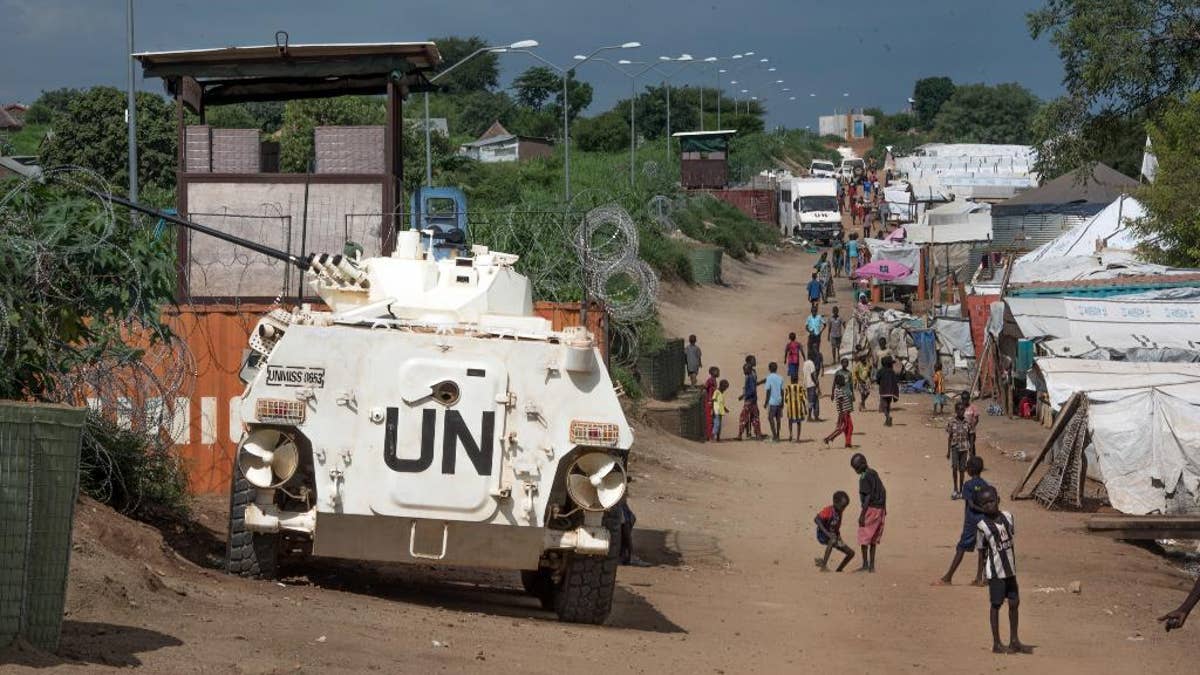
In this photo taken Monday, July 25, 2016, some of the more than 30,000 Nuer civilians sheltering in a United Nations base in South Sudan's capital Juba for fear of targeted killings by government forces. (AP Photo/Jason Patinkin) (The Associated Press)
Billions of donor dollars from the U.S. and other countries that pass through the United Nations too often end up with dictators and governments responsible for the crises that prompt the international aid effort in the first place, according to a wide range of critics and agencies involved in those efforts.
The issue of corrupt governments skimming off or seizing international aid and supplies isn't a new one, observers agree. But the scale of crises today in places like Burma, Rwanda and Syria, where the government of Bashar al-Assad has recaptured most all of the territory once held by rebels, has brought new attention to the problem of how to get aid to the people who actually need it.
“The Assad regime manipulates and exploits U.N. humanitarian assistance to benefit its loyalists and bolster its military operations at the expense of Syrians who are in genuine need,” Kenan Rahmani, advocacy manager at the Washington, D.C.-based Syria Campaign, told Fox News. “If the U.N. continues to compromise impartiality and independence, donor countries must find new channels to deliver humanitarian aid.”
The Assad government has controlled as much as 90 percent of the aid going to Syria, according to the campaign's investigations in recent years. As of April 2016, 88 percent of food aid went to government-held territory, with just 12 percent to areas outside the regime’s control. The number was even higher the previous year, when the government assigned over 99 percent of U.N. aid to its own territories.
According to the campaign’s investigations, the Syrian government has from the beginning of the conflict in 2011 allegedly used the explicit threat of revoking the U.N.'s permission to operate within the country’s borders. As a result, activists claim, thousands have died of malnutrition-related ailments and lack of medical care.
And even in situations where U.N. and other humanitarian groups were allowed to pass into opposition strongholds, all medical devices and life-saving medicines were removed by Assad’s soldiers at gunpoint, according to Jan Egeland, the head of the Norwegian Refugee Council.
The Syrian Ministry of Foreign Affairs provides an “approved list” of organizations the U.N. must partner with in the consignment of relief supplies. And all humanitarian agencies are forced to sign an agreement with the official government agency, the Syrian Arab Red Crescent.
Raed Al Saleh, head of the pro-opposition rescue group the Syrian Civil Defense – also known as the White Helmets – claimed the U.N.’s fealty to government control has been a problem since “day one” of the revolution-turned-civil war.
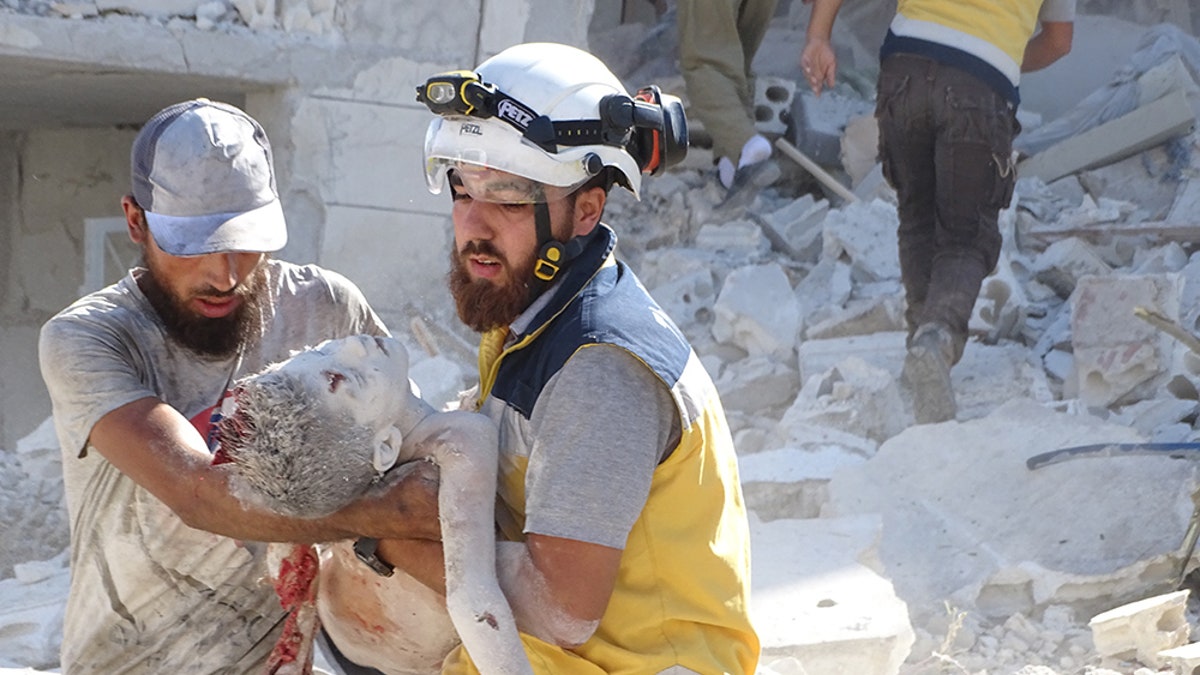
the White Helmets, also known as the Syrian Civil Defense, rescue victims form the rubble as pro-Assad forces resume airstrikes in the region (Syrian Civil Defense)
“The regime uses the humanitarian assistance to circumvent sanctions as everything has to go through them,” he said. “And there are other ways too. For example, all the U.N. staff stay at the Four Seasons in Damascus.”
Indeed, U.N. staff has spent almost $10 million at the Four Seasons in Damascus, which is co-owned by the Syrian government’s tourism ministry. U.N. staff continue to stay at the Four Seasons Hotel, noting it has been “cleared for security."
The U.N.’s own procurement records also show that by the end of 2016, they had also paid almost $18 million to companies connected to Assad, including a contract worth more than $750,000 to the Syria Trust for Development – a charity led by Assad’s wife Asma – who is subject to U.S. and EU sanctions.
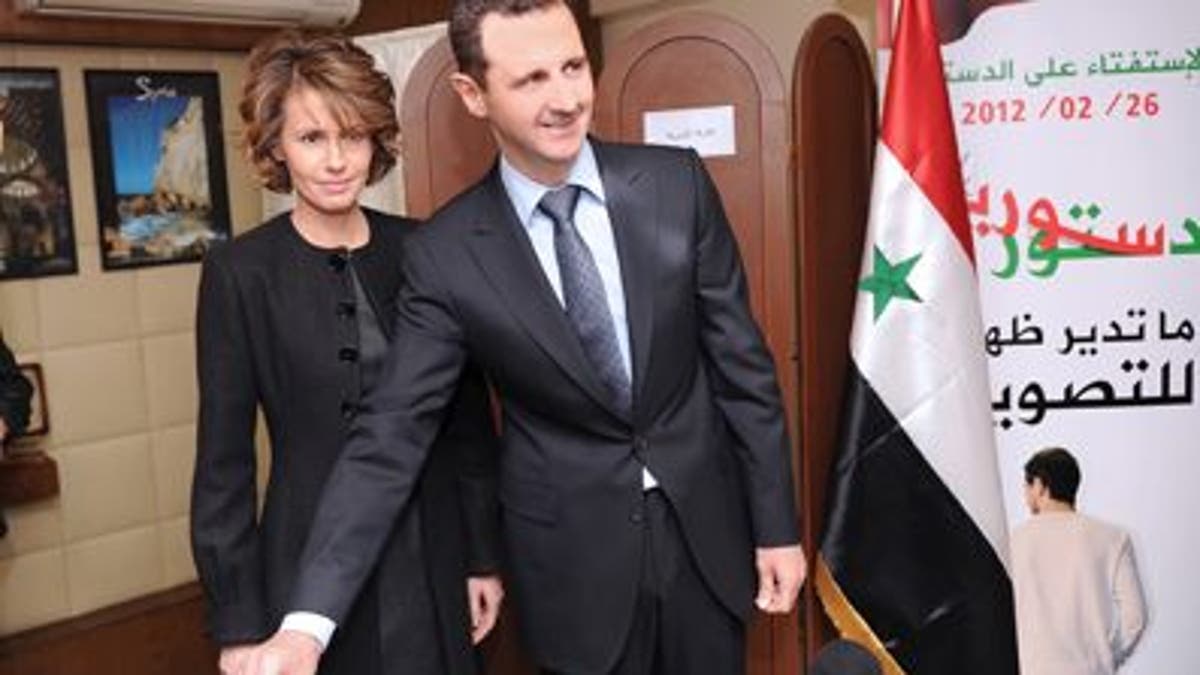
Feb. 26, 2012: In this photo released by the Syrian official news agency SANA, Syrian President Bashar Assad casts his ballot next to his wife Asma at a polling station during a referendum on the new constitution, in Damascus, Syria. (AP/SANA)
The U.N. has its own sanctions list, but is not beholden to those imposed by those of the United States, or regional alliances like the European Union.
A U.N. spokesperson told Fox News the organization “welcomes public scrutiny of its humanitarian operations” and publishes details online for public consumption. But the spokesperson also stressed the Syrian situation is rife with challenges, and argued courageous aid workers are doing their best.
“The U.N. is doing everything possible to reach over 13 million people in need,” the representative said. “The situation of civilians caught in the middle of warring parties is appalling, and it civilians who bear the brunt of inhumane actions by parties to the conflict.”
AGENCY WORKS TO END IRAN'S MANIPULATION OF IRAQ, TEMPER CHINA'S GROWING INFLUENCE
WIVES AND MOTHERS ON YEMEN'S FRONTLINE FIGHT TO FREE THOUSANDS OF MEN FROM PRISON HELL
Similar woes affect U.N. aid efforts in Africa, where aid agencies say governments line their pockets, while the larger population suffers without relief. At least 70 percent of public funds in Africa come from aid, and the African Union believes corruption costs the continent in excess of $50 billion a year, according to the African Union Convention on Preventing and Combatting Corruption (AUPCC).
For example, Rwanda remains a major benefactor of international aid in the aftermath of the 1994 genocide. But in 2013, the country’s leadership came under scrutiny from the U.S. for its involvement in regional conflicts, specifically in the Congo, where child soldiers were fighting for a rebel group. As a result, the Obama administration was forced to halt military aid.
That same year, the Rwanda government stated the United Nations had pledged $400 million over five years to help Rwanda reduce poverty, hunger and disease.
“U.N. oversight systems are designed with generous features to enable governments to cooperate and comply with mandates. This allows for complex plans and compliance actions,” observed global risk and financial analyst, Dennis Santiago. “But it’s a very leaky system that more often than not, promotes not just avoidance, but the arising of graft and corruption as well. It’s also very hard to tighten up because many U.N. members have a national interest in preserving their own options, to avoid U.N. expectations themselves.”
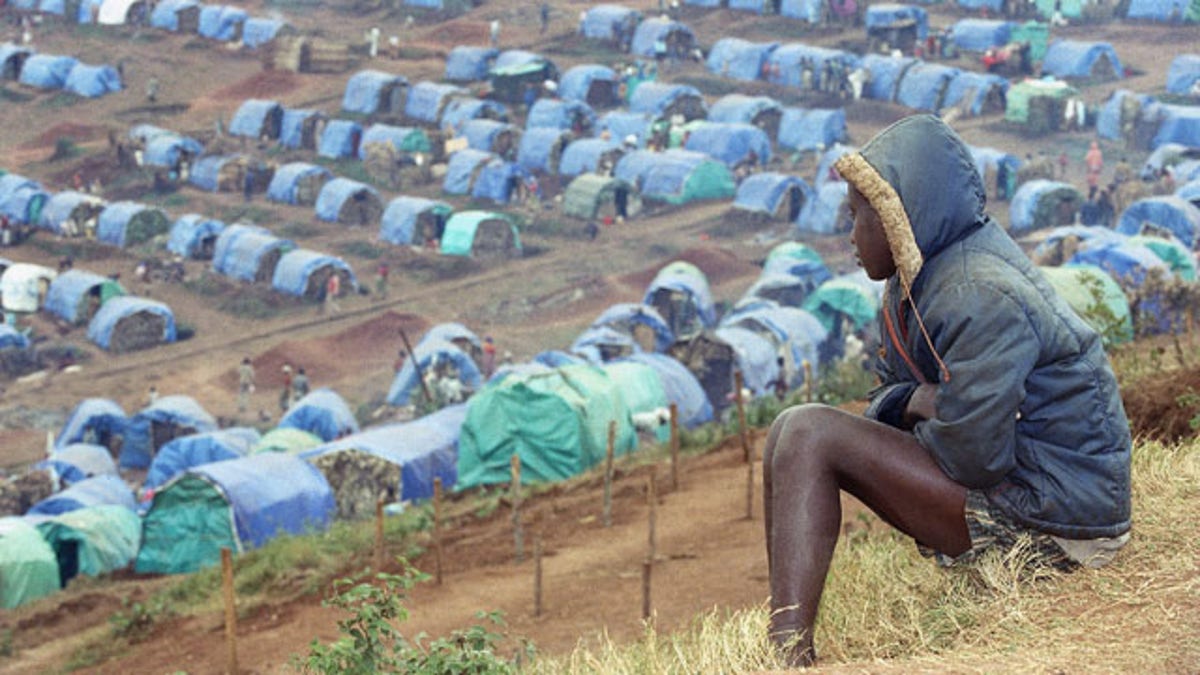
In this Aug. 25, 1994 file photo a young Tutsi refugee gazes upon the Tutsi camp of Nyarushishi, Rwanda, 6 miles southeast of Cyangugu. Two decades after the Rwandan genocide, France is finally opening what critics called its blind eye to justice over the killings. (AP)
Another U.N. group, the World Health Organization (WHO), last year cautioned that Somalia was at risk of suffering its third famine in the last two decades, and subsequently appealed for $1.5 billion in donations. But skeptics warned the country had long been a leading benefactor of aid – collecting more than $55 billion between 1991 and 2017 – with hundreds of millions alleged to have been soaked up by corruption.
Attention has also been focused on the world’s newest nation, South Sudan. The U.S. is South Sudan's largest bilateral aid donor, investing more than $11 billion in aid since the Comprehensive Peace Agreement was signed in 2005. The U.S. is also the largest contributor to the United Nations Mission in South Sudan (UNMISS) and this year alone, South Sudan received $709.2 million in aid in U.N. funding.
The aid pours in despite the fact the country’s leader, President Salva Kiir, has for five years been accused of orchestrating war crimes in a conflict that has claimed the lives of more than 400,000. Kiir’s government soldiers looted a World Food Programme warehouse in Juba in 2016 that resulted in the loss of 4,500 metric tons of food, which would have fed 220,000 people for a month.
“A lot of money was needed. Massive investment was needed in a very small space of time, but in addition there was also corruption,” acknowledged David Shearer, the U.N.’s Special Representative of the Secretary-General for South Sudan. “But the corruption came far less from outside money than from the oil wealth. The money was put into the pockets of elite South Sudanese, rather than into the country itself.”
Shearer noted South Sudan is rated as the second-most corrupt nation in the world - a hard reality known to aid agencies. “Most money is spent directly on projects rather than going through the government,” Shearer said. “But corruption is still going on, and it is a challenge.”
Similar problems plague aid efforts in North Korea, another area of intense international interest.
Earlier this year, the U.N. issued a desperate plea for some $111 million in humanitarian aid, after international donors backed off when it became evident the Pyongyang government was funding its nuclear weapons program instead of taking care of its starving and health-challenged population.
But even there, the U.N. must cooperate with the country's “legitimate” leaders, including dictator Kim Jong-un.
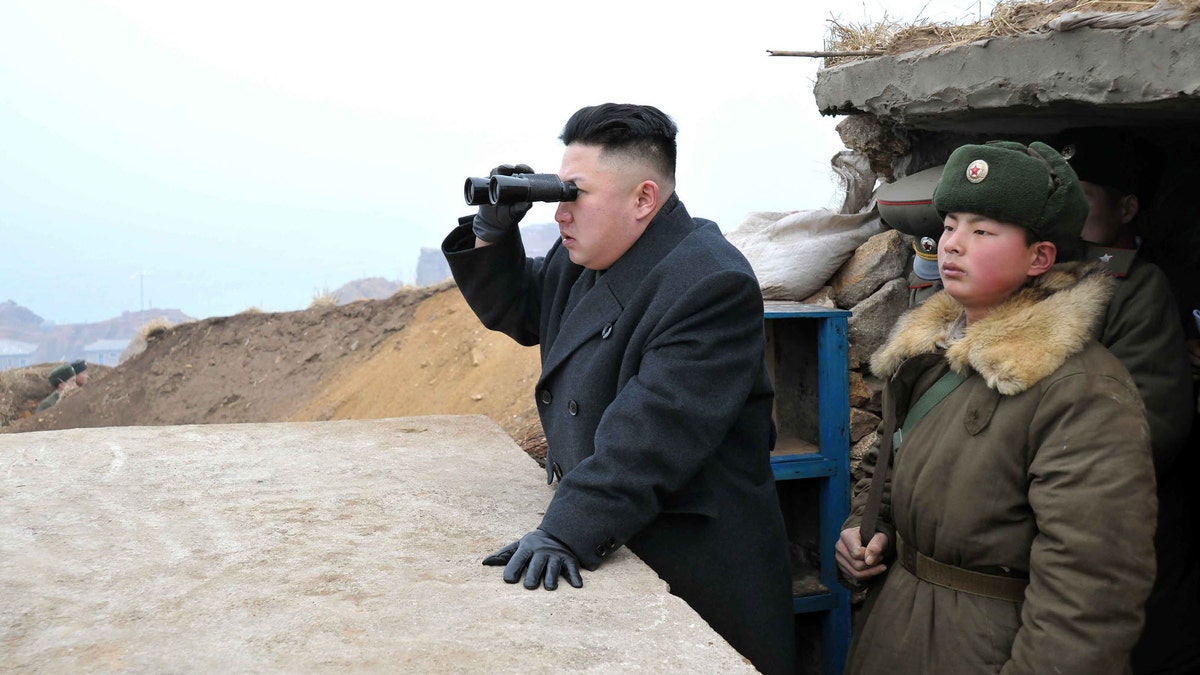
The 33-year-old dictator told his countrymen in January that North Korea is close to possessing the ability to strike around the world. While such a proclamation has softened, the people of North Korea remain in dire and starving conditions. (Associated Press)
“In all countries where we operate, we need to have an agreement with the host government allowing us to operate," the U.N. spokesperson explained. "But the key thing about our approach is that impartiality in humanitarian terms means that we provide life-saving and life-sustaining assistance to civilians based on their humanitarian needs, without consideration of where they are, which side in the conflict they may sympathize with, their nationality, social status, gender, age, religious belief or any other consideration.
This fundamental notion of impartiality guides our work, and is non-negotiable.”
Yet in Burma, also called Myanmar, the U.N. has been accused by a BBC investigation of “isolating staff who tried to warn that ethnic cleansing might be on the way,” and preventing human rights activists from visiting areas where many members of the Rohingya minority were believed to have been slaughtered.
“In a place like Burma, where the government has been responsible for killing its own people, working directly with the government all but guarantees that the aid is delivered directly to the soldiers of the oppressive government instead of the civilians who actually need it,” said Ephraim Mattos, East Asia Operations Manager for The Nazarene Fund (TNF), a humanitarian group that works to support the plight of Christians and persecuted minorities in Burma. “The unpleasant reality is that if you turn over aid to a government like Burma’s, the aid will go directly to the government’s army and you are essentially supporting the atrocities they commit.”
The U.S. has long been the U.N.’s biggest donor, providing 22 percent of the organization's core budget, and 25 percent of the peacekeeping budget. But the Trump adminstration has worked to reduce the U.S. role in the U.N. and various other international organizations. And outgoing Ambassador to the United Nations, Nikki Haley, has persistently mandated that reforms must be made to how the U.N. functions.
“U.N. assistance is hardly risk-free. Despotic governments may seize the assistance for themselves, without regard for the population,” said Max Abrahms, professor of political science at Northeastern University, and author of the new book “Rules for Rebels: The Science of Victory in Militant History.” “And non-state actors may gain strength from U.N. support that ends up prolonging the conflict. In the ways, the U.N. can paradoxically undermine its own ideals.”
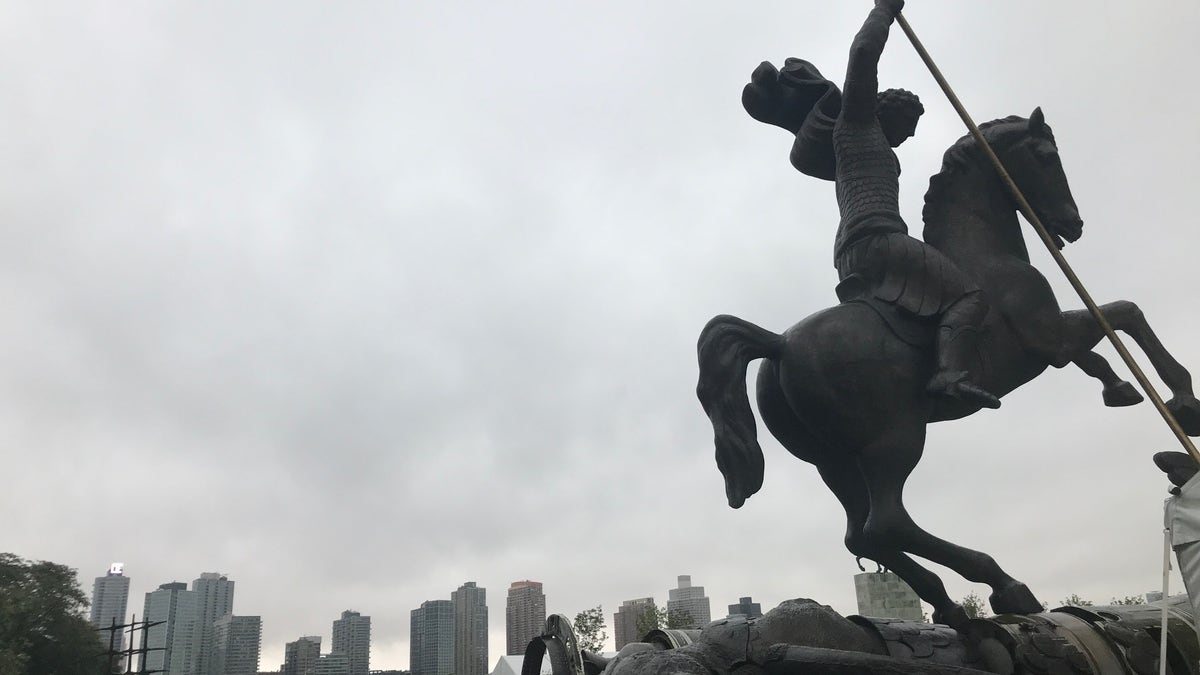
The United Nations Headquarters in New York, NY (Fox News/Hollie McKay)
But despite it's flaws, experts assert that U.N., while in need of change, maintains a unique and necessary function.
“The now permanently evolving global village requires self-interests be replaced by the interests of the whole,” said Dr. Christopher Gilbert, an international ethics consultant with NobleEdge. “The U.N. is the only venue where all the hosts of this unchangeable evolution will both judge and advance the villagers.”







































